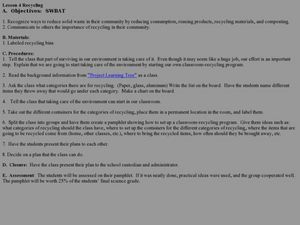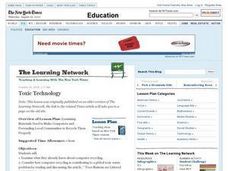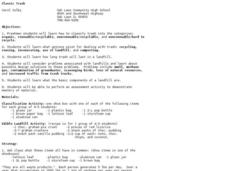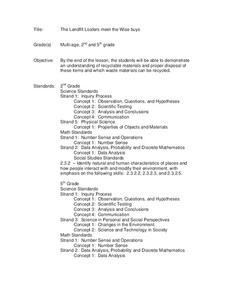Curated OER
Recycle Lifecycle
Students investigate the recycling process. For this recycling lesson, students read the article The Recycling Process After Collection and discuss the advantages of recycling. As an extension activity, students simulate the molding of...
Curated OER
Recycling
Students read or listen to a story, and discuss how it relates to them. In this personal event writing activity, students write about recycling. Students read "The Giving Tree" a Shel Silverstein poem and discuss the poem's meaning....
Curated OER
Recycling: lesson 4
Students create plans in order to reduce solid waste. For this recycling lesson plan, students discuss and come up with plans to reduce consumption, reusing products, recycling materials, and composting and then present their plans to...
Curated OER
Tissue Paper Puzzle Art
Get creative and use a tissue paper collage to make wonderful window hangings for the classroom. You'll find the materials list, objectives, and instructions needed to complete this fun activity. This project encourages eye-hand...
Curated OER
Sorting "Good" Junk (Recycling)
Second graders study recycling. In this environment lesson, 2nd graders discuss how to sort trash, sort actual trash labeling it, and explore the trash writing new uses of each item of trash instead of throwing the...
Curated OER
Recycling
Students explore the recycling process. In this recycling instructional activity, students gain understanding of how garbage is disposed of. Students makes lists of things that can be recycled. Students discuss how animals and plants are...
Curated OER
Three R's to Environmental Stewardship: Earth Day
Students explore the ways to conserve our natural resources. For this recycling, reusing, and reducing lesson students read Dinosaurs to the Rescue and apply their findings to learning ways to conserve resources. Students complete a...
Curated OER
Reduce, Reuse and Recycle
Learners explore the concept of waste management. In this environmental stewardship lesson, students study the nuances of the terms reduce, reuse, and recycle. Learners investigate ways to reduce, reuse, and recycle many everyday items...
Curated OER
Organic and Inorganic Recycling
Students examine their role in polluting the environment and discuss the importance of recycling. In groups, they place earthworms into compost piles to observe why they are considered natural recyclers. They also practice sorting a...
Curated OER
Recycling and Waste Disposal
In this recycling and waste disposal activity, students check one of 5 boxes with predictions on how long certain materials such as styrofoam and glass take to decompose and disappear underground. There are 10 items that students must...
Curated OER
Trash Goes To School
Middle schoolers explore solid waste background information. They are presented with a well balanced picture. Students review ideas on how to use solid waste issues in many fields including math, science, English, social studies and home...
Curated OER
Trash Inventions
Second graders develop a plan to recycle trash. In this environmental science instructional activity, 2nd graders sketch their invention and construct it. They present the final product in class.
Curated OER
Solid Waste
Learners determine the percentage increase in output of solid waste in the U.S. They determine the length of time it takes for throw away items to decompose.
SF Environment
Sort and Color!
Sorting is a very important skill that can be used in math and even science. Learners get familiar with some environmentally friendly vocabulary terms as they practice separating objects that can be recycled from those that can't. They...
Curated OER
Fabric Art
Do kids use problem solving skills when they create scrap art? You bet they do! After examining the art of Mary Katherine Lamb, they create their own pieces using recycled products and vintage art techniques. They watch a video about the...
Curated OER
The Waste-Free Lunch
Reusable packaging for school lunches seems like a wonderful and eco-friendly idea; however, some children are being chastised for not following one school's guidelines. This New York Times article engages learners in reading...
University of Colorado
Terra Bagga
Earth's magnetic poles switch positions about every 200,000—300,000 years. In the activity, groups create a planet with a magnetic field. Once made, they use a magnetometer to determine the orientation of the planet's magnetic field....
Curated OER
How to Make Recycled Egyptian Paper
Learners participate in a lesson that focuses on the production of Egyptian paper used for writing in modern times. They research the process of recycling and how it can help to preserve natural resources. Then students reproduce their...
Curated OER
Fan 3: Sort and Color!
Students explore the concept of recycling. In this environmental stewardship lesson, students discover how to recycle and compost. Students complete an activity that requires them to sort recyclable items.
Curated OER
TOXIC TECHNOLOGY
Young scholars examine what they already know about computer recycling and cconsider how computer recycling is contributing to a global toxic waste problem by reading and discussing the article, ""Poor Nations are Littered With Old PC's,...
Curated OER
Classic Trash
Learners investigate how trash is classified and the options to deal with it. In this trash and recycling lesson, students perform an activity to classify trash into organic, renewable/ recyclable, now renewable/recyclable and...
Curated OER
Making Paper
Young scholars make paper from recycled paper. The student estimates, counts, and measures he amount of paper consumed in a classroom daily. They discover that if we use too much paper, it fills up landfills. Some activities they are...
Curated OER
Magazine Mosaics
Almost every teacher has a stack of old magazines lying around. Get creative and turn them into mosaics! That's right, this resource explains how kids draw, design, cut, and paste to create mosaic art from recycled magazines. Connect...
Curated OER
The Landfill Loafers Meet the Wise Buys
Students discover recyclable materials and the proper disposal of those items through Internet research. Working in groups of four, they search the Internet for uses of recyclable materials. After research is complete, they participate...

























